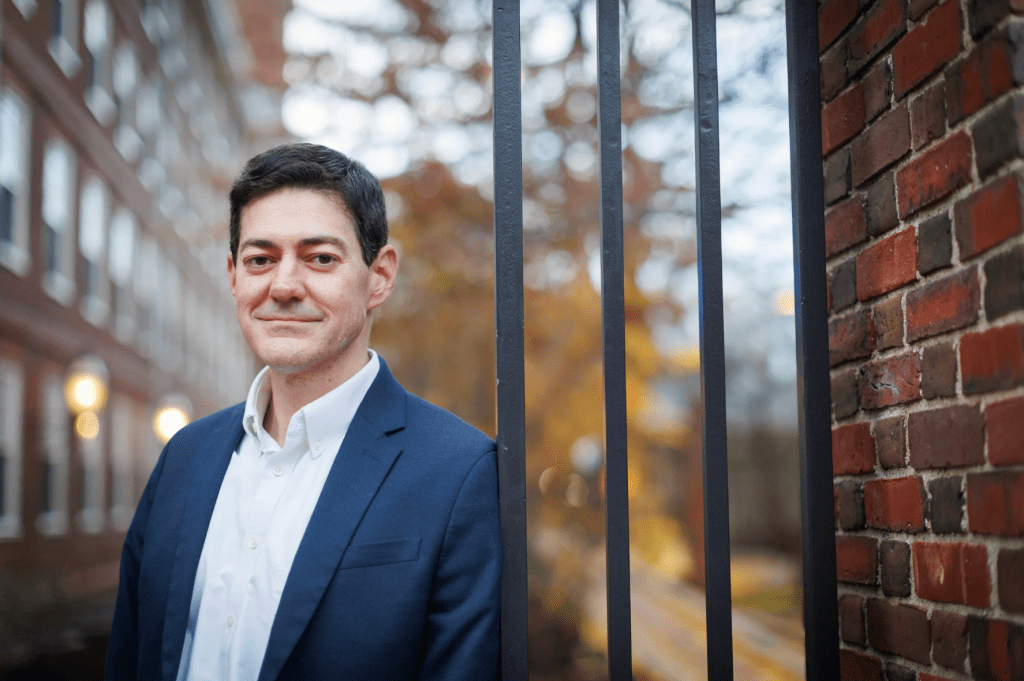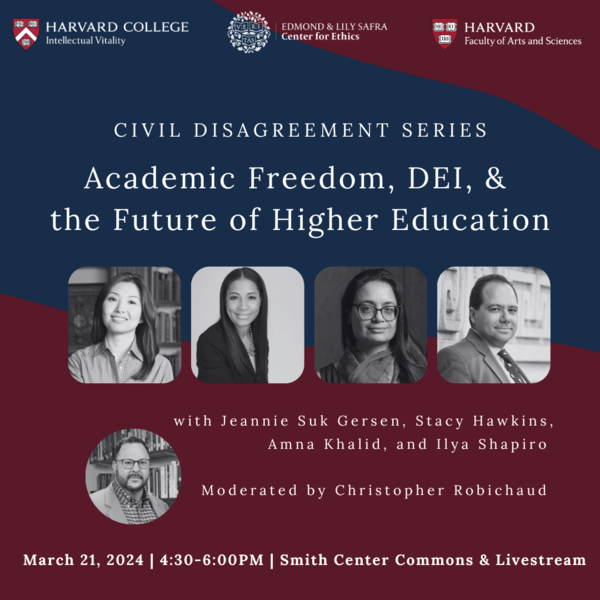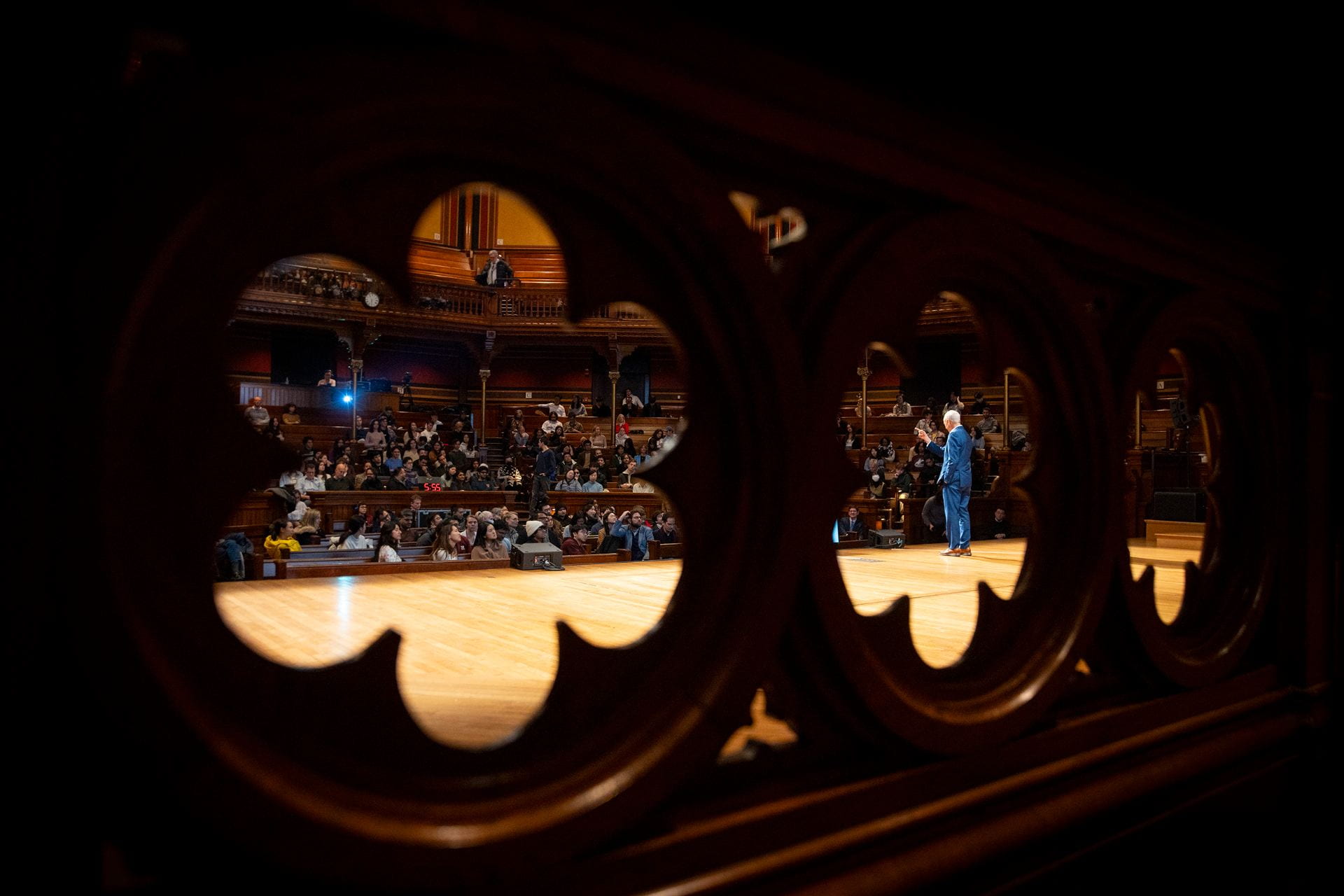The Faculty of Arts & Sciences is committed to building an inclusive academic environment that fosters critical thinking, empathy, and mutual understanding. In December 2023, Dean Hopi Hoekstra announced an initiative on civil discourse with the goal of advancing constructive dialogue in classrooms, seminar halls and meeting rooms across the FAS. The 2024 spring term is kicking off with events across the University designed to enhance our community’s skills to engage in respectful and robust debate. Information about all of the Harvard Dialogues events happening at FAS can be found below. As additional activities and events are planned for this spring, we will add them below.

Meet Professor Eric Beerbohm
Eric Beerbohm, Professor of Government, Director of the Edmond & Lily Safra Center for Ethics, and Faculty Dean of Quincy House, is Dean Hoekstra’s senior advisor on civil discourse. He will lead the effort to empower FAS students, faculty, and staff to share their diverse perspectives without fear of ridicule or hostility, leading to richer discussions.

As part of a commitment to open discourse on campus and off, Harvard held a series of events designed to model productive dialogue. “Harvard Dialogues,” which launched on January 18, 2024, was part of a broader initiative to address how the campus community can communicate more openly and constructively within classrooms and in the broader world. View all Harvard Dialogues events.
Upcoming Events
Spring 2024
Ethics Monday: “Mapping the Landscape of ‘Strategic’ Islamic Ethics” April 1
Monday, April 1
Noon – 1:30 p.m.
Dennis F. Thompson Seminar Room, Edmond & Lily Safra Center for Ethics
Ethics Monday: “Mapping the Landscape of ‘Strategic’ Islamic Ethics”
Dr. Khalil Abdur-Rashid
Islamic ethics is derived from Islamic jurisprudence, the teachings of Sufism, Arabic linguistics, social context, and Muslim International law & foreign policy. This presentation will feature a basic overview of the maxims and principles of ‘strategic Islamic ethics’ that relate to governance and conflict resolution. ‘Strategic’ Islamic Ethics is based in the assumption that effective governance and conflict resolution for Muslim nations begins with pursuing what’s in the best interest of the public, thereby elevating the public well-being and interest as a primary goal in statecraft and judicial legislation. It also marks a major shift in Islamic jurisprudential philosophy away from a human-rights centered paradigm towards a human-freedoms centered one.
Judaism is About Love April 4
Thursday, April 4
7:00 p.m.
Harvard Hillel and virtually (registration required)
Judaism is About Love
Rabbi Shai Held, Rabbi Sharon Cohen Anisfeld, and Dr. Jerome Groopman
Discussion of Held’s book, Judaism Is About Love: Recovering the Heart of Jewish Life.
Co-sponsored with Harvard Hillel
Ethics Monday: “Forgiveness” April 8
Monday, April 8
Noon – 1:30 p.m.
Dennis F. Thompson Seminar Room, Edmond & Lily Safra Center for Ethics
Ethics Monday: “Forgiveness”
Rev. Matthew Potts
Forgiveness as a moral practice has come under increased critique in political, religious, and philosophical circles. What is left in the idea or act of forgiveness that is morally useful, and what forms would a just forgiveness have to take?
Is it left? Is it woke? April 11
Thursday, April 11
4:30– 6:00 p.m.
Starr Auditorium, HKS
Is it left? Is it woke?
Susan Neiman
Drawing on her recent book Left is not Woke, Neiman argues that what’s currently understood as the liberal left is fuelled by traditionally liberal emotions, but is undermined by a range of very reactionary ideas. This has not only created great conceptual confusion, but also hampered the liberal left from effectively opposing far-right radicalism. The problem is not confined to the U.S., but has swept the globe in the past few years. Neiman will discuss both the theoretical and historical background to these threatening developments, and offer a set of principles around which all progressives can unite.
Pernicious Prejudice: Scholarly Approaches to Antisemitism and Islamophobia May 1
Wednesday, May 1
4:30– 6:00 p.m.
Tsai Auditorium
This in-person event is part of the Faculty of Arts and Sciences Civil Discourse Initiative and is open to Harvard ID holders. It will be livestreamed and available for viewing on our YouTube Channel.
The panel will focus on how leading social scientists conceptualize, measure, and study key forms of prejudice in the US context, focusing specifically on antisemitism and Islamophobia. The event will bring together top scholars who are at the forefront of studying these important and pernicious phenomena using rigorous, evidence-based data, methods, and sources.
Speakers
Jeffrey Kopstein, Director, Center for Jewish Studies; Professor, Department of Political Science, University of California, Irvine.
Nazita Lajevardi, Associate Professor, Department of Political Science, Michigan State University.
Kassra A.R. Oskooii, Associate Professor, Department of Political Science and International Relations, University of Delaware.
Sabine von Mering, Director, Center for German and European Studies; Professor of German and Women’s, Gender, and Sexuality Studies, Brandeis University.
Chair
Eric Beerbohm, Professor of Government; Director, Edmond & Lily Safra Center for Ethics, Harvard University.
Moderator
Melani Cammett, Center Director; Chair, Weatherhead Research Cluster on Identity Politics. Clarence Dillon Professor of International Affairs, Department of Government, Harvard University.
Cosponsored by the Edmond & Lily Safra Center for Ethics, Center for Jewish Studies, Center for Middle Eastern Studies, Center for American Political Studies, and FAS Civil Discourse Initiative.
Contact
Sarah Banse
Events Manager
sarahbanse@wcfia.harvard.edu
Past Events
PEN America’s Free Expression Student Summit
PEN America’s Free Expression Student Summit
Thursday, January 18–Friday, January 19 at the Richard A. and Susan F. Smith Campus Center
Sponsored by the Harvard College Intellectual Vitality Initiative
PEN America is coming to Harvard University this coming January for our first-ever Free Expression Student Summit for college students in Boston. This day-and-a-half-long program features a workshop series covering various free expression topics from across PEN America’s field of work, as well as special guest speakers and an advocacy simulation activity where students will be able to design campaigns centering issues they care about.
A Thursday night keynote panel, “Combating Censorship, Disinformation and Hate“, is open to the public. More information can be found here.
The January 18 and 19 workshops are open to registered undergraduate students only.
Setting the Table: Best Practices in Establishing Civil Discourse Norms in Classroom
Setting the Table: Best Practices in Establishing Civil Discourse Norms in Classroom
Friday, January 19 from 1:30–2:30 p.m., Virtual
In this workshop, open to FAS teaching faculty, we will think deeply about how to foster constructive dialogue and establish free and open conversations in our classrooms. By making small but important adjustments to our syllabi and modeling conversational norms early in the course, instructors can help students speak honestly and listen with empathy. Moderator Eric Beerbohm will discuss best practices with colleagues from the professional schools who have done much work on the subject and then open the conversation to the broader audience. Panelists include: Archon Fung (Harvard Kennedy School), Meira Levinson (Harvard Graduate School of Education) and Janet Halley (Harvard Law School).
This event is open to FAS faculty.
Intercollegiate Civil Disagreement Partnership (ICDP) Retreat
Intercollegiate Civil Disagreement Partnership (ICDP) Retreat
Friday, January 19–Sunday, January 22
This event follows the PEN America Free Expression Summit and will be the first in-person gathering for ICDP leadership and students. It is intended as an opportunity to: synthesize key takeaways from fall research efforts and their implications for the design of the ICDP going forward, identify the key design questions to be tackled during the spring and to develop a workplan, and to continue to build strong relationships among the group.
It follows work done in Fall 2023 by teams at each institution on their institution’s history, current work and future efforts surrounding civil dialogue and discourse as well as landscape research from outside the consortium.
This event is invitation-only; Harvard ICDP fellows + 1-3 students from each ICDP partner school
Dialogue Across Differences: Teaching and Learning in Polarized Times
Dialogue Across Differences: Teaching and Learning in Polarized Times
Tuesday, January 23
Is it possible to cultivate in students the ability to reason together about ethically charged questions, even when passions run high? How, at a time of toxic public discourse, can we help students acquire the civic virtues of listening and learning, persuading and being persuaded, in the company of those with whom they disagree?
For decades, Anne T. and Robert M. Bass Professor of Government Michael Sandel has challenged students to think together about some of most fraught questions of our time—affirmative action; same-sex marriage; free speech and hate speech; equality and inequality; the meaning of merit; the ethics of AI. In this special gathering of FAS faculty, Michael will show video clips of such debates and lead a discussion of the perils and possibilities of engaging with hard moral and political questions in the classroom and beyond.
This event is open to FAS faculty.
Harvard College Staff Summit on Free Expression with PEN America
Harvard College Staff Summit on Free Expression with PEN America
Wednesday, January 24
Sponsored by the Harvard College Intellectual Vitality Initiative
For this special professional development event, we will welcome guest speakers from PEN America, an organization with substantial experience offering programs that cover the basics of free speech on campus and that equip academic leaders, faculty, and staff to respond to a range of scenarios involving academic freedom, hate, and difficult dialogue.
This event is open to Harvard College staff, who can register to attend by Monday, January 22.
Harvard Paulson School of Engineering and Applied Sciences “Week of Dialogue” Events
SEAS is sponsoring faculty panels on three scientific topics—generative artificial intelligence, bionic technologies, and solar geoengineering— designed to promote and model full, vigorous, and civil discourse on critical and complicated issues.
Generative AI: Winners and Losers
Friday, January 26 from 11:00 a.m. – Noon in SEC LL2.224
Reception Noon – 12.30 p.m. in LL2 Atrium
Moderator: Stuart Shieber Panel: Boaz Barak, Finale Doshi-Velez, Hima Lakkaraju
The Bionic Human: Societal Challenges and Opportunities at the Frontier of Biomedical Innovation
Friday, January 26 from 11:00 a.m. – Noon in SEC LL2.229
Reception Noon – 12.30 p.m. in LL2 Atrium
Moderator: Jennifer Lewis Panel: Patrick Slade, Shriya Srinivasan, Elizabeth Suitor, Conor Walsh
Researching Solar Geoengineering: A Necessary Climate Approach or Dangerous Distraction
Friday, January 26 from 3– 4 p.m. in Pierce 209
Reception 4 – 4.30 p.m. in the hallway outside of Pierce 209
Moderator: Frank Keutsch Panel: Jim Anderson, Marianna Linz, Eli Tziperman, Steve Wofsy
These events are open to the Harvard community.
Hard Questions: Ethics in the Age of AI with Michael Sandel
Hard Questions: Ethics in the Age of AI with Michael Sandel
Wednesday, January 24
5:00-6:15 p.m.
Sanders Theatre, Memorial Hall
Sponsored by the FAS Civil Discourse Initiative
How can we think our way through the ethical dilemmas posed by new technologies? Is it possible to reason together, and argue together, about controversial questions with civility and mutual respect? To explore these questions, we invite all Harvard students to join Anne T. and Robert M. Bass Professor of Government Michael Sandel in Sanders Theatre for a lively, interactive session on the ethics of AI.
This marquee event in Harvard’s Week of Dialogue will invite students to consider some hard questions raised by AI, chatbots, and big data: Can tech help us find love? Do dating apps help or hinder our search for the ideal partner? Will AI change the meaning of friendship, companionship, and intimacy? Does technology erode the distinction between virtual and actual human connection? Will chatbots blur the line between life and death?
Following the discussion with Professor Sandel in Sanders Theatre, students are invited to continue the conversation over dinner in Annenberg and House dining halls in a dialogue led by Edmond & Lily Safra Center Fellows in Values Engagement. Although we will not likely resolve these questions in an evening, we hope this event will be the start of a continuing effort to put moral and civic reflection at the heart of the Harvard experience.
This event is open to all HUID holders (IDs will be checked).
Academic Freedom, DEI, & the Future of Higher Education March 21
Civil Disagreement Series: Academic Freedom, DEI, & the Future of Higher Education
March 21, 4:30 – 6:00 p.m.
In-Person (HUID holders only): Harvard Commons | Smith Campus Center | 1350 Massachusetts Ave
Increasingly, concerns about maintaining academic freedom are being pitted against the efforts of diversity, equity, and inclusion programs on college campuses. In what ways can universities promote student, faculty, and staff wellbeing and cultivate belonging while remaining spaces for inquiry and free expression of ideas?
This panel discussion, co-sponsored by the FAS Civil Discourse Initiative, the Harvard College Intellectual Vitality Initiative, and the Edmond & Lily Safra Center for Ethics, will bring together those who hold differing views on questions about academic freedom and DEI in higher education, informed by their various experiences and expertise. Together with the audience, they will examine the issues that motivate their differing views on the two topics and explore perspectives that are often overlooked. In the process, this series seeks to model best practices for effective dialogue across differences using techniques developed by the E&L Safra Center’s Intercollegiate Civil Disagreement Partnership.

Moderator
Christopher Robichaud is Senior Lecturer in Ethics and Public Policy at the Harvard Kennedy School of Government and Director of Pedagogical Innovation at the Edmond & Lily Safra Center for Ethics. He received his doctorate in philosophy from MIT. His interests surround ethics, political philosophy, and social epistemology, with a focus on examining the role of truth and knowledge in well-functioning democracies, and on understanding what the post-truth age of politics is.
Panelists
Jeannie Suk Gersen is the John H. Watson, Jr. Professor of Law at Harvard Law School, where she has taught constitutional law, criminal law and procedure, family law, and the law of art, fashion, and the performing arts. Before joining the faculty in 2006, she served as a law clerk to Justice David Souter on the United States Supreme Court, and to Judge Harry Edwards on the U.S. Court of Appeals for the D.C. Circuit. She was educated at Yale (B.A. 1995), at Oxford (D.Phil 1999) where she was a Marshall Scholar, and at Harvard Law School (J.D. 2002), where she was a Paul & Daisy Soros Fellow. She has written three books and many articles in scholarly journals and general media. Her book, At Home in the Law, was awarded the Law and Society Association’s Herbert Jacob Prize for the best law and society book of the year. She has been a Guggenheim Fellow and a recipient of Harvard Law School’s Sacks-Freund Award for Teaching Excellence. She is a Contributing Writer to The New Yorker.
Professor Stacy Hawkins is an award-winning teacher and scholar. She formerly served as the Vice-Dean of Rutgers Law School in Camden, where she also teaches courses in Constitutional Law, Employment Law and an original seminar on Diversity and the Law. She is the recipient of numerous honors, including the 2023 Chancellor’s Award for Diversity, Equity & Inclusion Leadership, the 2022 BLSA Champion for Social Justice Award, and the 2018 AALS Derrick A. Bell Award. She was also named Faculty of the Year by the graduating class of 2013 and Co-Professor of the Year by the graduating class of 2018. In addition to law teaching, Professor Hawkins has spent more than two decades advising and training clients in both the public and private sector on issues of workplace diversity. She has held or holds a number of professional and civic appointments, including as a member of the New Jersey Supreme Court Committee on Diversity, Inclusion & Community Engagement, as an Advisory Board Member of the Public Interest Law Center, and as an inaugural member of the Pennsylvania Bar Association Diversity Team.
Amna Khalid is an Associate Professor in the Department of History at Carleton College in Northfield, Minnesota. She specializes in modern South Asian history, the history of medicine and the global history of free expression. Growing up under a series of military dictatorships, Amna developed a strong interest in issues relating to censorship and free expression. She speaks and writes frequently on academic freedom, free speech, DEI and campus politics. Her essays and commentaries have appeared in The Chronicle of Higher Education, The Conversation, Inside Higher Ed and The New Republic. She hosts a podcast and accompanying blog called Banished, which explores censorship in the past and present.
Ilya Shapiro is a senior fellow and director of constitutional studies at the Manhattan Institute. Previously he was executive director of the Georgetown Center for the Constitution, and before that a vice president of the Cato Institute. He is the author most recently of Lawless: The Miseducation of America’s Elites (forthcoming 2024), which examines the illiberal takeover of legal education. He is a member of the board of fellows of the Jewish Policy Center, is chairman of the board of advisers of the Mississippi Justice Institute, and previously served on the Virginia Advisory Committee to the U.S. Commission on Civil Rights.
Resources
Intellectual Vitality at Harvard College
Through intellectual vitality, the Harvard College community seeks to establish a culture in which all members speak, listen, and ask questions of each other – and ourselves – with curiosity and respect. This is critical to achieve the mission of Harvard College and what we as a community believe in.
Edmond & Lily Safra Center for Ethics
The Edmond & Lily Safra Center for Ethics seeks to strengthen teaching and research about pressing ethical issues; to foster sound norms of ethical reasoning and civic discussion; and to share the work of our community in the public interest.
Candid & Constructive Conversations at the Harvard Kennedy School
Harvard Kennedy School (HKS) is committed to strengthening the ability of our students, staff, and faculty to have candid and constructive conversations across difference.
